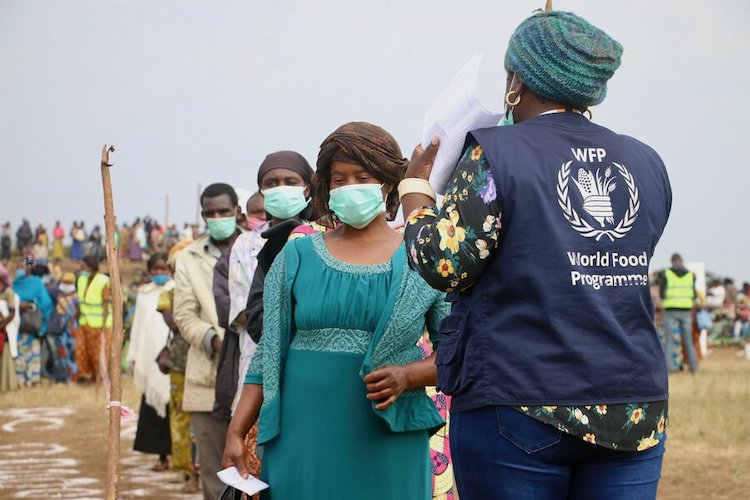By Benjamin Anguandia, WFP
KINSHASA (IDN) — Kesereka, who prefers to go by Sadi, accepts a stack of cash from a World Food Programme (WFP) officer in a small room in the Democratic Republic of the Congo’s northeastern town of Mabalako.
He counts it carefully, folding it neatly, so it fits in his small pocket.
The 90,000 Congolese francs for the month, about US$45, is enough to settle his family into a new home—and to buy the tools he needs to resume his work as a motorcycle mechanic.
Born with a leg disability, Sadi, now 25, walks using his hands. Before violence forced him to flee, he was well known as the best motorcycle mechanic in his home village of Mutwanga.
Around him, people wait in a long queue under the hot morning sun for their own monthly cash assistance. Like Sadi, all have had their lives turned upside down by long-running rebel violence in this spectacularly scenic mountain region.
With multiple armed groups operating in an area where death and displacement are common, this slice of the DRC’s Nord Kivu province is known locally as the “triangle of death.”
So far, WFP’s assistance has reached more than 125,000 conflict-affected families here in Nord Kivu’s Beni territory, which helps them to buy food and build small businesses. The people decide for themselves how to spend the money.
The funds offer a measure of stability in a region where thousands have been killed and millions displaced by the unrest. In recent months, the conflict has intensified, compounding a longstanding legacy of burnt homes, destroyed crops, dead livestock and shattered lives. More than eight million people now need emergency food assistance.
“We’re not here because people can’t grow enough food”, says Wilfred Nkwambi, Goma-based head of WFP’s office for eastern DRC. “They can – or they could. However, conflict and insecurity prevent too many families from being able to farm.”
Fearing the worst
For Sadi, a husband and father of two, the cash has delivered an extra bonus.
“Without this assistance, I might not have been able to find my wife after we were separated by a rebel attack on our village,” he says.
That attack, forever etched in his memory, occurred early one morning in 2021. Sadi was at his motorcycle workshop in his home village of Mutwanga, 80 kilometres west of Mabalako.
As gunfire erupted, a villager shouted: “Quick, quick! The rebels are here.”
The killing had already begun.
Sadi raced to his mud-and-stick house. He found the front door wide open, and his seven-year-old son, Nzanzu, who had run home from school, standing outside, petrified and distraught.
His wife, Kavira, and five-year-old daughter, Masika, were nowhere to be seen.
Sadi chats with a WFP staff member after receiving his cash assistance. Photo: WFP/Benjamin Anguandia
“I feared the worst, thinking they had been abducted, if not killed,” Sadi says. “But, in that moment, I had no choice but to flee with my boy.”
The pair scrambled onto the back of a truck heading to Mabalako. Along the way, Sadi kept asking if anyone had seen his wife and daughter.
“I told myself that I would not be able to rest until somebody gave me information on my family’s whereabouts,” he says. “When I received the cash assistance the first time, I used some of the money to buy airtime credit for my phone, so I could call people in my village who had escaped the attack using a different route.”
Uncertain future
He believes the attack may have cost lives, and destroyed crops and livestock that families depended on.
But there was one piece of good news. Sadi learned that his wife and daughter had escaped Mutwanga, making their way to Butembo, about 100 km to the southwest. That is where the family was eventually reunited—after Sadi hired a motorbike to get there, using some of the WFP cash.
“I’ve never been so relieved or happy in my life,” Sadi says.
Besides helping him to buy food for the family and resume work as a mechanic, WFP’s cash assistance has allowed Sadi to rent a plot of land near Mabalako. Today, the family grows a mix of crops, including cassava, rice, maize and beans for their food needs—hoping to sell the surplus to bring in more revenue.
Sadi’s wife, Kavira, hopes to complete a dress-making course she began before the Mutwanga attack, which will also help to boost the family income.
Wherever and however possible, WFP gives families like Sadi’s the fresh start they need and deserve. But many here are also keenly aware that violence continues to stalk the region—and their future is uncertain. [IDN-InDepthNews — 13 October 2022]
Photo: People in eastern DRC wait for their monthly cash assistance. Credit: Benjamin Anguandia.
IDN is the flagship agency of the Non-profit International Press Syndicate.
This article is published under the Creative Commons Attribution 4.0 International licence. You are free to share, remix, tweak and build upon it non-commercially. Please give due credit.

